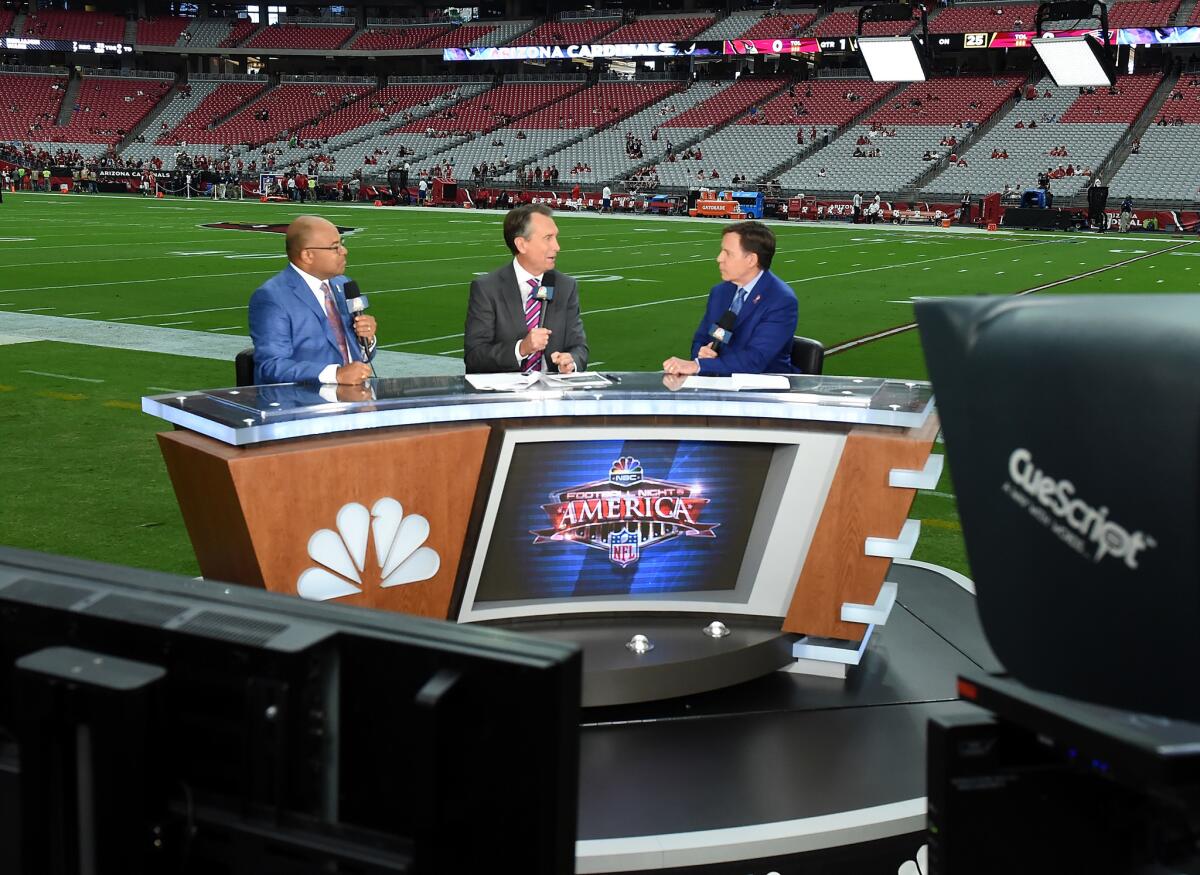No NBCUniversal-Charter deal? Then no ‘Sunday Night Football’ for Spectrum customers

- Share via
With a Saturday night deadline looming, NBCUniversal and Charter Communications continued talks to try to reach a new carriage deal to advert a blackout of NBC-owned television channels in nearly 16 million homes in the U.S. with Spectrum cable-TV service.
NBCUniversal’s current contract with Charter expires Saturday at 9 p.m. Pacific time. If no agreement is in place by that time, Charter would be forced to drop NBC owned channels. Spectrum customers in several markets, including Los Angeles, New York and San Diego, also would lose coverage of their local NBC television stations.
That means more than 1.6 million Spectrum homes in the Los Angeles region could be without KNBC-TV Channel 4 on the eve of a high-profile NFL “Sunday Night Football” game between the Green Bay Packers and the Detroit Lions.
More than 100,000 Spectrum households in northern San Diego County would be affected. NBC owns the local television affiliate, KNSD-TV Channel 7 in San Diego, which would be part of the blackout. More than 1 million homes with Spectrum service in New York would be included, as well as 400,000 Spectrum homes in Dallas.
Spectrum customers also would lose access to the Spanish-language Telemundo network and 12 cable outlets, including USA Network, Bravo, Syfy, E!, NBC Sports, Golf Channel, CNBC and MSNBC.
NBCUniversal, however, could grant a contract extension to allow Charter to continue to carry its channels while the two companies work to iron out a deal.
The dispute centers on proposed price hikes for the NBC channels, according to people familiar with the talks.
NBC on Thursday declared an impasse in the negotiations, but discussions between the two sides resumed Friday.
NBC executives have been laboring for five years to raise their programming fees, which are well below industry averages. When the previous round of deals were struck about six years ago, NBC was owned by General Electric, and the NBC broadcast network was on the ropes — in fourth place among the big broadcast networks. NBC had considerably less bargaining power than rivals such as Walt Disney Co., which owns ABC, ESPN and Disney Channel.
“NBCUniversal is the No. 1 media company in America and we put a fair deal in front of Charter that is consistent with the rest of the industry,” Matt Bond, chairman of NBCUniversal Content Distribution, said Friday. “We hope they will agree to these terms.”
But Connecticut-based Charter Communications has incentives to drive a hard bargain. Last year, the company swallowed the much larger Time Warner Cable, which gave Charter considerable heft in carriage negotiations — and the company is testing its clout as the nation’s second-largest cable operator.
In addition, Charter took on more than $25 billion in debt to finance the Time Warner Cable acquisition, and Charter’s executives have been under pressure to more efficiently manage operations and hold the line on programming costs.
Pay-TV operators industrywide are struggling to navigate an increasingly fraught environment. They have been losing customers who opt for cheaper alternatives for TV entertainment, such as streaming services like including SlingTV, Netflix and Hulu. Traditional operators are worried about losing more customers who have grown weary of paying higher cable bills for the same channels.
NBCUniversal, meanwhile, is facing its own delicate dance. Its parent company, Comcast Corp., is the nation’s largest cable television company, and Comcast is dealing with similar concerns about rising programming costs. Comcast separately has been trying to negotiate a new carriage deal for 21st Century Fox’s television channels, including the popular Fox News Channel and a dozen regional sports networks.
CBS Corp., meanwhile, has been engaged in negotiations with AT&T’s DirecTV unit, and those talks appear to be progressing.
ALSO
Business quiz 2016: Test your knowledge of movers and shakers, deals and disasters
Twitter rolls out live 360-degree video and hints at tweet-editing feature
Obama’s foreclosure prevention program has helped far fewer homeowners than expected
More to Read
Inside the business of entertainment
The Wide Shot brings you news, analysis and insights on everything from streaming wars to production — and what it all means for the future.
You may occasionally receive promotional content from the Los Angeles Times.











